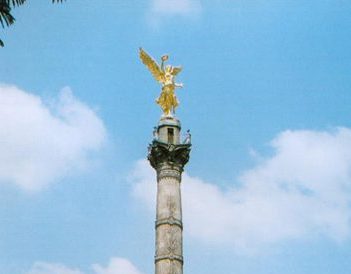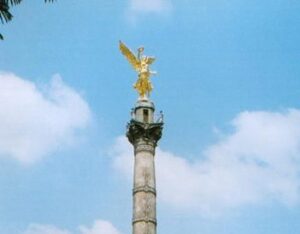

Andrew Payti
Monumento a la Independencia
Fireworks are lighting up the sky. It’s the eve of September 16 in the Zócalo of Mexico City. From the balcony of the National Palace, the president of Mexico rings a bell and cries out “¡Viva México!” to the crowd below. The crowd shouts back “¡Viva!” Can you guess what is being celebrated?
It’s November 1, and families are gathered in cemeteries all over Mexico at the graves of family members who have passed on. They are laughing, singing, and sharing stories and treasured memories of their deceased loved ones as they eat favorite foods from the ofrendas they have lovingly prepared. Have you heard about this celebration before?
Just north of Mexico City, tens of thousands of people are gathered in the plaza of a beautiful basilica on December 12. Vendors are selling delicious food and beautiful crafts, and people are dancing and singing to the music of mariachi bands. Some of the people make their way toward the basilica on their knees. What does all this commemorate?
On a clear December night, a procession of children and adults moves from house to house, knocking on doors and singing a request to be let in. Time after time they are not permitted to enter, until finally they reach a home where they are warmly welcomed. Canyou name this celebration?
If you thought of el Día de la Independencia for the first question, el Día de los Muertos for the second question, el Día de la Virgen de Guadalupe for the third question, and Las Posadas for the last question, you’re absolutely right! Although many holidays in Mexico are regional, and therefore only celebrated in certain locales, Independence Day (September 16), the Day of the Dead (November 1–2), the day honoring the patron saint of Mexico, the Virgin of Guadalupe (December 12), and the Posadas (December 16-24) are celebrated throughout the country.
Explore More:
1. Do an Internet search for videos related to the holiday celebrations discussed in the article. There are many interesting videos available, and since some are in Spanish, it’s a great way to practice your listening skills.
2. El Día de la Raza and el Natalicio de Benito Juárez are two more interesting Mexican holidays. See what you can find out about these celebrations.
3. Choose the Mexican holiday that most interests you and do some research to learn more about it. Discover all you can about the customs and traditions surrounding the celebration. Present the information in Spanish to your Spanish class. If your school hosts or participates in a multicultural fair or festival, you could present your report during this event.
4. Each Mexican holiday has certain foods associated with it. Look up authentic recipes in Spanish for pozole, chiles en nogada, pan de muerto, calabaza en tacha, calaveras de azúcar, buñuelos, raspados, and tamales and determine for which holiday these foods are prepared. Perhaps you’d like to prepare one or more of these dishes to share with your family or classmates.
5. Do an Internet search to discover the most important holidays in other Spanish-speaking countries. What other holidays did you discover? Are any of the holidays the same as or similar to those we celebrate in the United States? Write a few notes in Spanish about what you learned. Then share the information with your Spanish class. You may even want to include pictures in your presentation.
Share What You Know:
1. Here in the United States, many people celebrate Cinco de Mayo. Do you know what this holiday commemorates? Is the celebration of Cinco de Mayo as important in Mexico as el Día de la Independencia?
2. Why might the year 2010 have been an especially important Día de la Independencia celebration?
3. Have you ever been in a cemetery? Does your family have any special traditions that you observe in remembrance of loved ones who have died?
4. You may have noticed that many Mexican holidays are related to Catholicism. Do you know why that is?
5. Which holidays do you and your family celebrate? Do you have a favorite? What are the origins and history of this holiday? If you’re not sure, you can talk with your parents or grandparents about it. It also might be interesting to hear details about what their favorite holiday was when they were growing up.